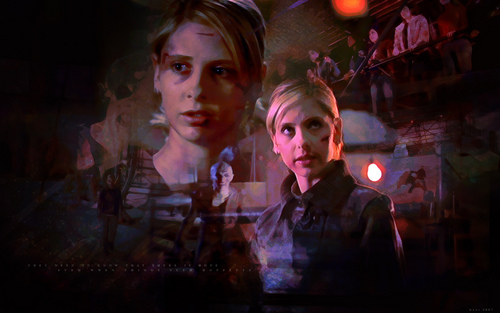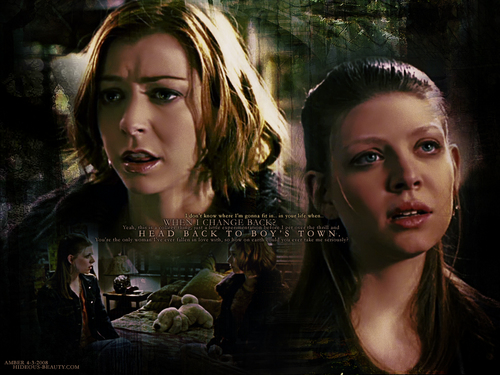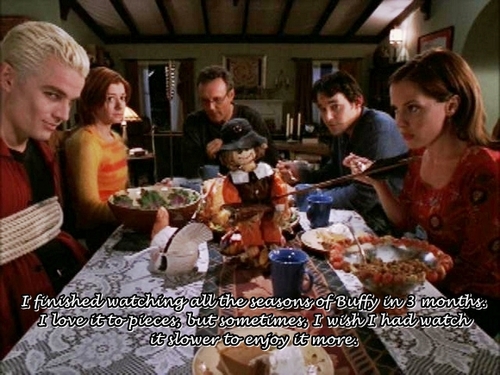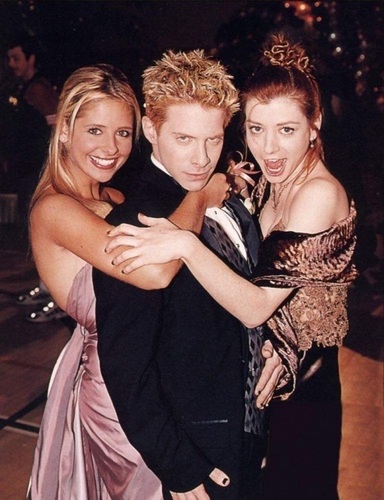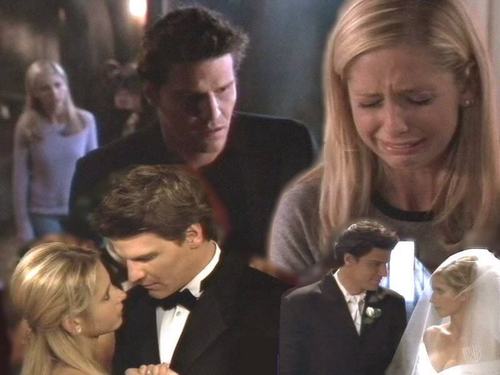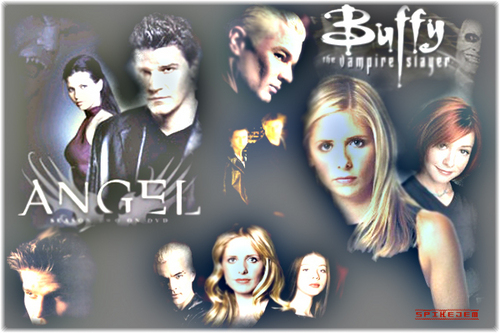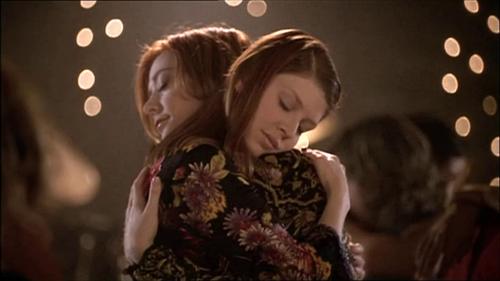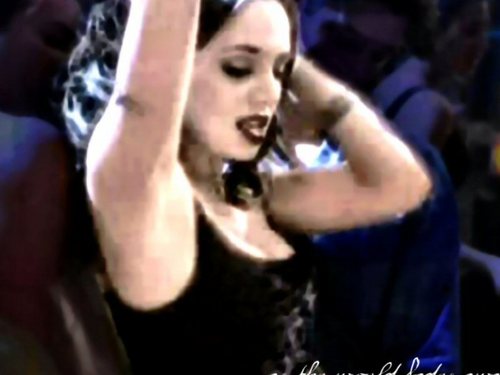Buffy the Vampire Slayer was created by Joss Whedon for the purpose of subverting sexist conventions in the horror genre. Joss describes himself as a feminist, and he promotes feminism through the characters and storylines of Buffy. But while characters may behave in a feminist way, I got to thinking about how feminism itself is depicted in the Buffyverse – it exists as a movement there as it does here, after all. So, here’s a study of how feminism as a movement is portrayed in the Buffyverse.
First of all, I think it’s a good idea to try to get a grip on what Joss’ views are specifically. There are a lot of different variants of feminism. Although I haven’t been able to find anything where he describes what variant he subscribes to, he does say in link that he was raised as a radical feminist. With nothing else to go on, I think it’s reasonable to assume that he accepts radical feminist philosophy. I’ll supply link’s description of what radical feminism is:
Radical feminism is a philosophy emphasizing the patriarchal roots of inequality between men and women, or, more specifically, social dominance of women by men. Radical feminism views patriarchy as dividing rights, privileges and power primarily by gender, and as a result oppressing women and privileging men.
Radical feminists tend to be more militant in their approach (radical as "getting to the root"). Radical feminism opposes existing political and social organization in general because it is inherently tied to patriarchy. Thus, radical feminists tend to be skeptical of political action within the current system, and instead support cultural change that undermines patriarchy and associated hierarchical structures.
Radical feminism opposes patriarchy, not men. To equate radical feminism to man-hating is to assume that patriarchy and men are inseparable, philosophically and politically.
In Buffy the Vampire Slayer, feminism is generally portrayed positively. Misogynist villains are defeated by female protagonists with modern sensibilities that include appreciation for feminist ideas, though it is hard to separate an actual portrayal of feminism from feminist thematic elements. Explicit references include the season two episode “Halloween”, where Buffy thinks romantically of the life of an eighteenth century noblewoman, and Willow disagrees and indicates she prefers living in an age where women have the right to vote.
In the episode “I Only Have Eyes For You”, also of season two, Cordelia expresses disdain for the concept of the Sadie Hawkins dance because it’s more effort for her to have to ask guys out and have to pay, decides to organize a boycott, and asks who dared to suggest the concept in the first place. Xander, humoring her, suggests some “hairy-legged feminist”. At this point of the series, Cordelia is a walking parody, and the humor comes from her getting so angry about what is truly a progressive thing for women for shallow reasons. Due to the ironic nature of the joke, feminism comes off in a good light.
Then in the season four episode “The Freshman”, Buffy (and presumably Willow) has a ton of people thrusting flyers at her as she walks around UC Sunnydale. “Have you accepted Jesus Christ as your personal savior?” asks one flyer person. There’s some kind of protest going on. There’s a guy advertizing free Jello shots at a party. Buffy’s overwhelmed by it all. She runs into Willow, who trades her a Take Back the Night flyer in exchange for the one about Jello shots. Take Back the Night, a feminist rally against sexual assault, is here presented as one of many ideological activities and general events being promoted on campus.
In the season four episode “Hush”, Willow joins the Wiccan club at UC Sunnydale. Joss’ take on Wicca is a benevolent people of literal witches who embrace femininity, and were driven underground by misogynist cultures. The women who joined the witch club, save for Willow and Tara, are all wanna-blessed-bes who joined because they thought the idea sounded cool but don’t really have any clue what they’re talking about. One of them suggests that holding a bake sale would be empowering, which Willow treats with derision. Here we have wannabe feminists who get the idea wrong, but our protagonist Willow has the right idea.
Later in the season six episode “Once More With Feeling”, Xander explicitly draws a connection between Wicca and feminism: “It could be witches. Some evil witches… [Willow and Tara glare] which is ridiculous ‘cause witches – they were persecuted. Wicca good, and love the Earth, and women power, and I’ll be over here.” Presumably his praises of Wicca were from details picked up from Willow and/or Tara off-screen.
In the spin-off Angel, season three, episode “Sleep Tight”, Angel confronts antagonist Lilah about why she’s so nasty all the time. She says she has to be “better, smarter, [and] quicker than every man in Wolfram and Hart”. Angel surmises that “it’s a feminist thing”, and she adds that it’s about survival. Even though Wolfram and Hart is evil incorporated and they sack you with actual sacks, I imagine Joss using Lilah in a way to promote feminism in the real world. Again, we have the issue of distinguishing feminism as a movement from thematic elements, but it’s notable for the explicit use of the word “feminist”.
“I know you’ve got this whole female power, Take Back the Night thing and I think that’s cute…”
–Halfrek, to Anya, episode “Entropy”
These are all little parts that explicitly have to do with feminism. I think an interesting larger example is the character Anya(nka), who lived a thousand years cursing men who had hurt their wives/girlfriends, and earned the title of being the “patron saint” of scorned women, though perhaps matron saint would be a better description. She is a portrayal of man-hating (misandry) coupled with feminism, and in many ways seems a parody of misandristic feminists.
Originally, she was Aud, a young Norse woman who was selfless and cared for stray rabbits. When her husband(?) Olaf cheated on her, she reacted with hostility and turned him into a troll with witchcraft. The vengeance demon D’Hoffryn saw potential, and offered her a job as the vengeance demon Anyanka to spend an immortality of cursing men.
D’Hoffryn: “But only to those who deserve it.”
Aud: “They all deserve it.”
D’Hoffryn: “That’s where I was going with that, yeah.”
–“Selfless”
As Anya, she looks back on her days as a vengeance demon without guilt, and in season three episode “The Prom” says explicitly that she thinks men are evil. “I have witnessed a millennium of treachery and oppression from the males of the species and I have nothing but contempt for the whole libidinous lot of them.”
She starts to lose this viewpoint after getting romantically involved with Xander, but goes back to her old ways after he leaves her at the altar. As a vengeance demon once again, in season six episode “Entropy” she tries to get people to make a wish that Xander would suffer so that she can grant it with her demon powers. This leads to a humorous montage of Anya’s various attempts with all her friends.
The relevant part is when she approaches Willow and Tara, and references a feminist stereotype. “Now, you’re lesbians, so the hating of men will come in handy.” Some radical feminists embrace the concept of political lesbianism, which is based in the idea that sexual orientation is a choice and so otherwise straight women choose to engage in gay relations so as to make a political statement about the worthlessness of men. As Anya is very much a misandrist, she just assumed that lesbians date women because they reject men rather than the positive aspect of liking women more than men.
Willow and Tara say as much to Anya, asserting that it’s not about hating men and is about loving women. Anya changes tack and brings up men like Xander liking to watch lesbians making out. Willow and Tara think it’s normal for straight guys to be into that, causing Anya to angrily exclaim that if they love men so much they should just go love men. “What kind of lesbians are you?” Anya associates lesbians with misandristic feminists, and cannot understand their perspective. Frankly, I think the way straight guys turn lesbians into their sexual fantasies is a bit of a problem in society, but as Xander doesn’t make a jerk out of himself because of having such fantasies I think it’s okay as long as he keeps it to himself and doesn’t make Willow, Tara, et al. uncomfortable.
So, is Anya a feminist? I would say no. Her job, or her calling, or whatever you’d call it, has really always been about men. Anya hates men because of what her husband Olaf did to her, and spent a thousand years getting her unending vengeance. Anya didn’t really strive to make women’s lives better. Sometimes her acts of vengeance accomplished this, but hurting men has always been the goal, and sometimes her acts of vengeance even hurt the women involved. Feminism by its definition is about empowering women. Anya may agree with feminism in principle, but has never really acted with it as her primary motivation. That’s what I think, anyway.
In conclusion, Buffy as a feminist show contains various little references to feminism as a movement. Most of these are positive, promoting feminism in general, or are neutral. The only negative references are to some worse forms of feminism that promote hate. As the displays of feminist-related content are so bound up in the thematic elements of the story and characters it is difficult to separate the two and focus only on explicit references to feminism. My brief look at the character of Anya is something of a divergence from the main topic, but I believe it is important to discuss the character in this kind of article.
First of all, I think it’s a good idea to try to get a grip on what Joss’ views are specifically. There are a lot of different variants of feminism. Although I haven’t been able to find anything where he describes what variant he subscribes to, he does say in link that he was raised as a radical feminist. With nothing else to go on, I think it’s reasonable to assume that he accepts radical feminist philosophy. I’ll supply link’s description of what radical feminism is:
Radical feminism is a philosophy emphasizing the patriarchal roots of inequality between men and women, or, more specifically, social dominance of women by men. Radical feminism views patriarchy as dividing rights, privileges and power primarily by gender, and as a result oppressing women and privileging men.
Radical feminists tend to be more militant in their approach (radical as "getting to the root"). Radical feminism opposes existing political and social organization in general because it is inherently tied to patriarchy. Thus, radical feminists tend to be skeptical of political action within the current system, and instead support cultural change that undermines patriarchy and associated hierarchical structures.
Radical feminism opposes patriarchy, not men. To equate radical feminism to man-hating is to assume that patriarchy and men are inseparable, philosophically and politically.
In Buffy the Vampire Slayer, feminism is generally portrayed positively. Misogynist villains are defeated by female protagonists with modern sensibilities that include appreciation for feminist ideas, though it is hard to separate an actual portrayal of feminism from feminist thematic elements. Explicit references include the season two episode “Halloween”, where Buffy thinks romantically of the life of an eighteenth century noblewoman, and Willow disagrees and indicates she prefers living in an age where women have the right to vote.
In the episode “I Only Have Eyes For You”, also of season two, Cordelia expresses disdain for the concept of the Sadie Hawkins dance because it’s more effort for her to have to ask guys out and have to pay, decides to organize a boycott, and asks who dared to suggest the concept in the first place. Xander, humoring her, suggests some “hairy-legged feminist”. At this point of the series, Cordelia is a walking parody, and the humor comes from her getting so angry about what is truly a progressive thing for women for shallow reasons. Due to the ironic nature of the joke, feminism comes off in a good light.
Then in the season four episode “The Freshman”, Buffy (and presumably Willow) has a ton of people thrusting flyers at her as she walks around UC Sunnydale. “Have you accepted Jesus Christ as your personal savior?” asks one flyer person. There’s some kind of protest going on. There’s a guy advertizing free Jello shots at a party. Buffy’s overwhelmed by it all. She runs into Willow, who trades her a Take Back the Night flyer in exchange for the one about Jello shots. Take Back the Night, a feminist rally against sexual assault, is here presented as one of many ideological activities and general events being promoted on campus.
In the season four episode “Hush”, Willow joins the Wiccan club at UC Sunnydale. Joss’ take on Wicca is a benevolent people of literal witches who embrace femininity, and were driven underground by misogynist cultures. The women who joined the witch club, save for Willow and Tara, are all wanna-blessed-bes who joined because they thought the idea sounded cool but don’t really have any clue what they’re talking about. One of them suggests that holding a bake sale would be empowering, which Willow treats with derision. Here we have wannabe feminists who get the idea wrong, but our protagonist Willow has the right idea.
Later in the season six episode “Once More With Feeling”, Xander explicitly draws a connection between Wicca and feminism: “It could be witches. Some evil witches… [Willow and Tara glare] which is ridiculous ‘cause witches – they were persecuted. Wicca good, and love the Earth, and women power, and I’ll be over here.” Presumably his praises of Wicca were from details picked up from Willow and/or Tara off-screen.
In the spin-off Angel, season three, episode “Sleep Tight”, Angel confronts antagonist Lilah about why she’s so nasty all the time. She says she has to be “better, smarter, [and] quicker than every man in Wolfram and Hart”. Angel surmises that “it’s a feminist thing”, and she adds that it’s about survival. Even though Wolfram and Hart is evil incorporated and they sack you with actual sacks, I imagine Joss using Lilah in a way to promote feminism in the real world. Again, we have the issue of distinguishing feminism as a movement from thematic elements, but it’s notable for the explicit use of the word “feminist”.
“I know you’ve got this whole female power, Take Back the Night thing and I think that’s cute…”
–Halfrek, to Anya, episode “Entropy”
These are all little parts that explicitly have to do with feminism. I think an interesting larger example is the character Anya(nka), who lived a thousand years cursing men who had hurt their wives/girlfriends, and earned the title of being the “patron saint” of scorned women, though perhaps matron saint would be a better description. She is a portrayal of man-hating (misandry) coupled with feminism, and in many ways seems a parody of misandristic feminists.
Originally, she was Aud, a young Norse woman who was selfless and cared for stray rabbits. When her husband(?) Olaf cheated on her, she reacted with hostility and turned him into a troll with witchcraft. The vengeance demon D’Hoffryn saw potential, and offered her a job as the vengeance demon Anyanka to spend an immortality of cursing men.
D’Hoffryn: “But only to those who deserve it.”
Aud: “They all deserve it.”
D’Hoffryn: “That’s where I was going with that, yeah.”
–“Selfless”
As Anya, she looks back on her days as a vengeance demon without guilt, and in season three episode “The Prom” says explicitly that she thinks men are evil. “I have witnessed a millennium of treachery and oppression from the males of the species and I have nothing but contempt for the whole libidinous lot of them.”
She starts to lose this viewpoint after getting romantically involved with Xander, but goes back to her old ways after he leaves her at the altar. As a vengeance demon once again, in season six episode “Entropy” she tries to get people to make a wish that Xander would suffer so that she can grant it with her demon powers. This leads to a humorous montage of Anya’s various attempts with all her friends.
The relevant part is when she approaches Willow and Tara, and references a feminist stereotype. “Now, you’re lesbians, so the hating of men will come in handy.” Some radical feminists embrace the concept of political lesbianism, which is based in the idea that sexual orientation is a choice and so otherwise straight women choose to engage in gay relations so as to make a political statement about the worthlessness of men. As Anya is very much a misandrist, she just assumed that lesbians date women because they reject men rather than the positive aspect of liking women more than men.
Willow and Tara say as much to Anya, asserting that it’s not about hating men and is about loving women. Anya changes tack and brings up men like Xander liking to watch lesbians making out. Willow and Tara think it’s normal for straight guys to be into that, causing Anya to angrily exclaim that if they love men so much they should just go love men. “What kind of lesbians are you?” Anya associates lesbians with misandristic feminists, and cannot understand their perspective. Frankly, I think the way straight guys turn lesbians into their sexual fantasies is a bit of a problem in society, but as Xander doesn’t make a jerk out of himself because of having such fantasies I think it’s okay as long as he keeps it to himself and doesn’t make Willow, Tara, et al. uncomfortable.
So, is Anya a feminist? I would say no. Her job, or her calling, or whatever you’d call it, has really always been about men. Anya hates men because of what her husband Olaf did to her, and spent a thousand years getting her unending vengeance. Anya didn’t really strive to make women’s lives better. Sometimes her acts of vengeance accomplished this, but hurting men has always been the goal, and sometimes her acts of vengeance even hurt the women involved. Feminism by its definition is about empowering women. Anya may agree with feminism in principle, but has never really acted with it as her primary motivation. That’s what I think, anyway.
In conclusion, Buffy as a feminist show contains various little references to feminism as a movement. Most of these are positive, promoting feminism in general, or are neutral. The only negative references are to some worse forms of feminism that promote hate. As the displays of feminist-related content are so bound up in the thematic elements of the story and characters it is difficult to separate the two and focus only on explicit references to feminism. My brief look at the character of Anya is something of a divergence from the main topic, but I believe it is important to discuss the character in this kind of article.


